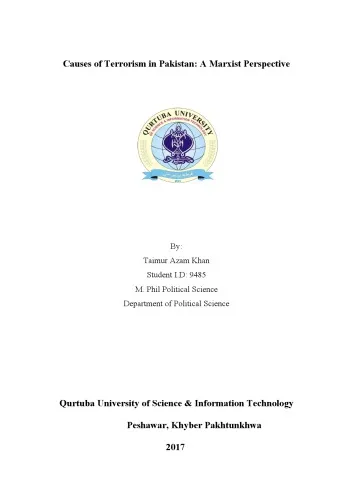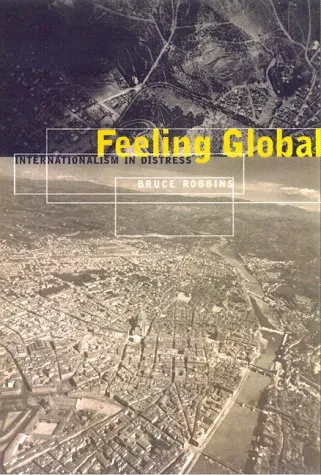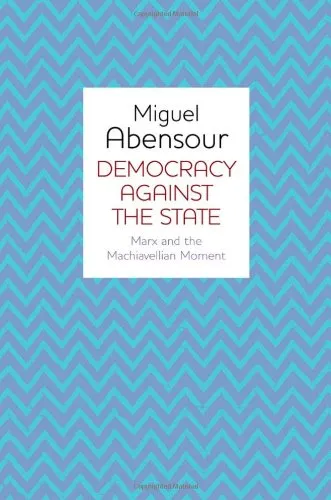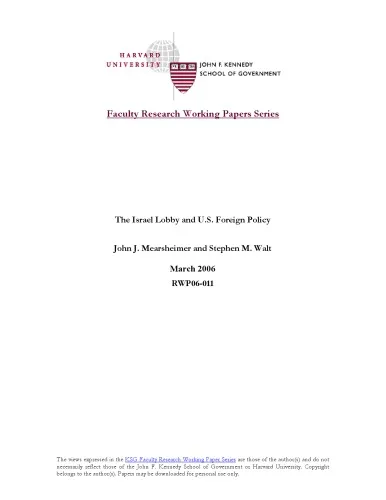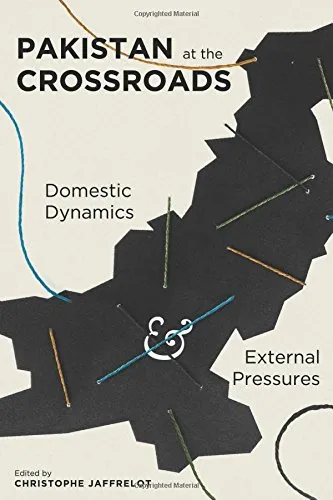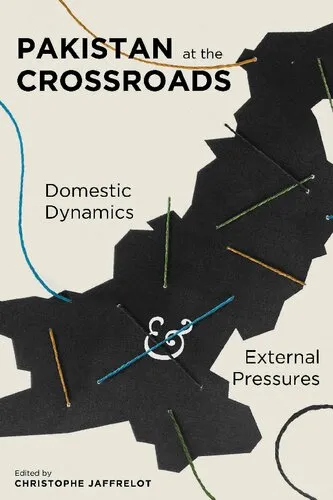Causes of Terrorism in Pakistan: A Marxist Perspective
3.8
بر اساس نظر کاربران

شما میتونید سوالاتتون در باره کتاب رو از هوش مصنوعیش بعد از ورود بپرسید
هر دانلود یا پرسش از هوش مصنوعی 2 امتیاز لازم دارد، برای بدست آوردن امتیاز رایگان، به صفحه ی راهنمای امتیازات سر بزنید و یک سری کار ارزشمند انجام بدینکتاب های مرتبط:
معرفی کتاب: Causes of Terrorism in Pakistan: A Marxist Perspective
کتاب Causes of Terrorism in Pakistan: A Marxist Perspective نوشته من، تیمور اعظم خان، مطالعهای عمیق و تحلیلی درباره ریشهها و علل تروریسم در پاکستان است که از دیدگاه مارکسیستی بررسی میشود. این کتاب با تمرکز بر ساختارهای اقتصادی، نابرابریهای اجتماعی و نقش تاریخی امپریالیسم، به خوانندگان دیدگاهی نوین برای درک دلایل پیچیده این پدیده ارائه میدهد.
خلاصهای از کتاب
تحلیل تروریسم در پاکستان به عنوان یک مسئله تاریخی، اجتماعی و سیاسی، بخشی محوری از محتوای این کتاب را تشکیل میدهد. در این اثر، من نظریههای مختلف درباره چرایی و چگونگی ظهور تروریسم در این منطقه را مورد بررسی قرار دادهام. با تمرکز بر تحلیل طبقاتی و چارچوب تاریخی، این کتاب تأثیر فقر، نابرابری اقتصادی و سیاستهای اقتصادی نئولیبرالی را بر گسترش موجهای تروریسم به تصویر میکشد. همچنین، تأثیر جنگ سرد، مداخلات امپریالیستی و سیاستهای استعماری بر شکلگیری و تقویت گروههای تروریستی، با رویکرد تاریخی و مارکسیستی بررسی شدهاند.
کتاب به سه بخش اصلی تقسیم شده است: بخش نخست مروری تاریخی بر ریشههای تروریسم در پاکستان دارد. بخش دوم تحلیل مارکسیستی از تأثیر ساختارهای اقتصادی-اجتماعی بر رشد تروریسم است. و بخش سوم به نقش جهانیسازی، امپریالیسم و سیاستهای قدرتهای بزرگ در تقویت تروریسم میپردازد. هر فصل با شواهد مستند و مثالهای تاریخی پشتیبانی شده است، که مطالعه را هم ساده و هم علمی میسازد.
نکات کلیدی
- تحلیل طبقاتی از علل ریشهای تروریسم و نابرابری اجتماعی
- بررسی تأثیر سیاستهای اقتصادی نئولیبرالی و پروژههای جهانیسازی
- نقش جنگ سرد در شکلگیری پدیده تروریسم در کشورهای جهان سوم
- ارائه دیدگاه مارکسیستی و مقابله با روایتهای غالب لیبرال
- رابطه بین ساختار قدرت داخلی و مداخلات بینالمللی
جملات معروف از کتاب
"تروریسم صرفاً یک مشکل امنیتی نیست؛ بلکه یک نتیجه اجتنابناپذیر از سیستمهای ناعادلانه اقتصادی و اجتماعی است که از سوی قدرتهای بزرگ تحمیل شدهاند."
"برای فهم تروریسم، باید به دنبال ریشههای اقتصادی و طبقاتی آن در ساختارهای اجتماعی نابرابر باشیم."
"سیاستهای امپریالیستی چیزی فراتر از اشغال نظامی هستند، بلکه ابزارهایی قوی برای ایجاد فقر و به تبع آن خشونت در جوامع محسوب میشوند."
چرا این کتاب مهم است؟
کتاب Causes of Terrorism in Pakistan: A Marxist Perspective فراتر از یک تحلیل ساده از تروریسم، به بررسی جامع پدیدههای ساختاری، اجتماعی و جهانی میپردازد که زمینهساز خشونت در پاکستان شدهاند. این اثر از آن جهت اهمیت دارد که دیدگاهی جایگزین ارائه میدهد و روایتهای تحریفشده جریانهای غالب جهانی درباره علل تروریسم را به چالش میکشد. همچنین، این کتاب ابزاری ارزشمند برای دانشجویان، محققین سیاسی و علاقهمندان به نظریههای مارکسیستی و تحلیل ساختاری است تا بتوانند با رویکرد انتقادی به مسائل جهانی نگاه کنند.
این اثر فرصتی استثنایی برای خوانندگان ایجاد میکند تا علاوه بر شناخت مشکلات اجتماعی-سیاسی پاکستان، راه حلهایی علمی و عملی برای مقابله با تروریسم توسعه یافته از منظر مارکسیسم بیابند. بر اساس آمارها و تحلیلهای دقیق، این کتاب یک منبع بینظیر و جامع است که خواندن آن برای درک عمیقتر وضعیت فعلی و تاریخی پاکستان ضروری است.
Introduction
Causes of Terrorism in Pakistan: A Marxist Perspective delves deep into the historical, political, economic, and ideological roots of terrorism within Pakistan, using a Marxist lens to dissect the systemic and structural causes of this persistent crisis. Written in a time when global discourse on terrorism is often dominated by rhetoric rather than substantive analysis, this book aims to untangle the web of socio-economic inequalities, imperialist interventions, and class struggles that have contributed to Pakistan's troubled landscape. By aligning historical materialism with modern socio-political narratives, the book provides a thought-provoking framework to understand a deeply complex and harrowing issue.
Terrorism in Pakistan is often presented as a religious or cultural issue by mainstream analyses, but this book challenges that limited perspective. Instead, it strives to offer a comprehensive understanding by addressing how capitalism, class stratification, feudal power structures, foreign imperialism, and the contradictions of the state have fueled the flames of extremism. By addressing both domestic and international dimensions, this book gives readers a critical understanding of the phenomena through rigorous analysis and progressive inquiry.
Summary of the Book
Causes of Terrorism in Pakistan: A Marxist Perspective is divided into several chapters that explore terrorism not as an isolated event but as the outcome of broader systemic issues. From the legacy of colonialism to the structural distortions introduced by neoliberal economic policies, the book methodically dissects the role of state institutions, class relations, and global capitalism in perpetuating cycles of violence.
The analysis begins by tracing the socio-political history of Pakistan since its independence, focusing on the uneven development of its industrial and agrarian sectors. It then moves to explore the role of religion as a socio-political tool, manipulated by the ruling class and foreign powers for their interests. The book also delves into the militarization of the society, heavily facilitated by alliances with imperialist powers during the Cold War and the War on Terror.
While it critiques the global forces that have destabilized Pakistan, it does not neglect the internal dynamics of oppression and exploitation. The feudal economy, class antagonisms, patriarchal structures, and the state apparatus’ alignment with capitalist ambitions are interrogated systematically. The book ends with a call for structural reforms that focus on social justice and equitable redistribution of wealth to address the deeply embedded roots of terrorism.
Key Takeaways
- Terrorism in Pakistan is not merely a religious or cultural issue but primarily a symptom of socio-economic inequalities and class struggles.
- The state's alignment with Western imperialist agendas has destabilized domestic politics and led to militarization and extremism.
- Religion, when weaponized as a political tool, becomes an instrument for ruling class hegemony and control.
- A Marxist understanding of Pakistan requires us to view terrorism as a systemic issue rooted in exploitation and economic underdevelopment.
- Lasting peace in Pakistan requires structural reforms, decolonization of economic policies, and equitable redistribution of resources for all strata of society.
Famous Quotes from the Book
"The extremism that manifests in acts of violence is not born in mosques or seminaries—it is cultivated in the inequities of feudal estates, the backrooms of neoliberal negotiations, and the corridors of imperialist power."
"When the laboring classes are chained to poverty, and religion becomes a tool to justify oppression, terrorism is but a cry from the depths of systemic failure."
"Peace does not emerge from war on terror; it emerges from connecting humanity through class solidarity and eradicating the structures that foster exploitation."
Why This Book Matters
Causes of Terrorism in Pakistan: A Marxist Perspective is more than just an academic exploration; it is a necessary contribution to both global and local discourses on terrorism. At a time when global narratives are dominated by simplistic explanations, this book encourages readers to think critically and historically about terrorism—not as an isolated phenomenon but as an expression of deeper societal contradictions.
In Pakistan, the devastating consequences of terrorism have become a national crisis, but without addressing its root causes, no sustainable solution can be formulated. By presenting a Marxist analysis, this book provides a new way to conceptualize the issue, linking capitalism and class-based exploitation to the rise of extremism. It is particularly valuable for academics, policymakers, activists, and anyone interested in pursuing peace and justice in an increasingly fraught world.
The book matters not only because of its unique perspective but because it fosters a nuanced mindset towards understanding and resolving terrorism. It forces its readers to look beyond surface-level causes and question the structures that perpetuate inequity and violence. In doing so, it becomes a critical resource in the struggle for a more just and harmonious society, both in Pakistan and globally.
دانلود رایگان مستقیم
شما میتونید سوالاتتون در باره کتاب رو از هوش مصنوعیش بعد از ورود بپرسید
دسترسی به کتابها از طریق پلتفرمهای قانونی و کتابخانههای عمومی نه تنها از حقوق نویسندگان و ناشران حمایت میکند، بلکه به پایداری فرهنگ کتابخوانی نیز کمک میرساند. پیش از دانلود، لحظهای به بررسی این گزینهها فکر کنید.
این کتاب رو در پلتفرم های دیگه ببینید
WorldCat به شما کمک میکنه تا کتاب ها رو در کتابخانه های سراسر دنیا پیدا کنید
امتیازها، نظرات تخصصی و صحبت ها درباره کتاب را در Goodreads ببینید
کتابهای کمیاب یا دست دوم را در AbeBooks پیدا کنید و بخرید
1446
بازدید3.8
امتیاز0
نظر98%
رضایتنظرات:
3.8
بر اساس 0 نظر کاربران
Questions & Answers
Ask questions about this book or help others by answering
No questions yet. Be the first to ask!
